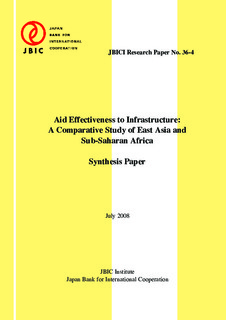Aid Effectiveness to Infrastructure: A Comparative Study of East Asia and Sub-Saharan Africa . Synthesis Paper
Research report
Permanent lenke
http://hdl.handle.net/11250/2474773Utgivelsesdato
2008-08-26Metadata
Vis full innførselSamlinger
- Publications [1488]
Originalversjon
Tokyo: Japan Bank for International Cooperation (JBICI Research Paper no. 36-4) 49 p.Sammendrag
Responding to a renewed call for aid to economic infrastructure, the JBIC Institute launched a study on effectiveness of aid to infrastructure projects. While the analysis of the effectiveness of infrastructure projects - and of aid in general - has been conducted using macro-level economic data that overlook the complex ground realities, this study conducted in-depth case studies of sixteen projects in eight countries in Sub-Saharan Africa and East Asia. By selecting the two regions which have a dramatic divergence in development performance, the study tried to comparatively examine how infrastructure projects did (or did not) trigger regional and/or national development and contribute in sustaining the outcome of the projects. In order to identify the "triggers", the study focused on institutional changes that occurred during the project implementation. The result of the case studies suggests that when endogenous institutions were improved and/or strengthened, through long-term interaction between recipients and donors, the developed institutions would contribute to maximize and sustain project outcomes. The study also identifies the importance of background factors that trigger institutional changes; long-term development plans coupled with a strong will of political leaders, long-term and comprehensive donor support, and institutional continuity of local agencies. Alf Morten Jerve, jointly with Machiko Nissanke of SOAS, London, were responsible for the analytical framework and the synthesis report.
